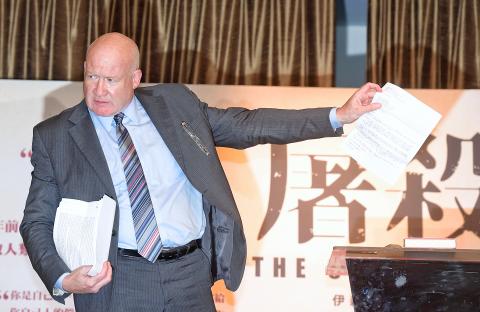Taipei Mayor Ko Wen-je’s (柯文哲) election campaign office yesterday said baseless accusations should not be made for electoral gains and asked US author Ethan Gutmann to explain why he changed his attitude about accusations that Ko was involved in organ harvesting in China.
The office made the remarks after a news conference in Taipei yesterday, when Gutmann answered questions about his 2014 book The Slaughter: Mass Killings, Organ Harvesting, and China’s Secret Solution to Its Dissident Problem in which Ko was one of the interviewees.
Wu Hsiang-hui (吳祥輝), a political pundit and owner of Butterfly Orchid Cultural Creativity who plans to publish a Chinese-language version of the book, on Sept. 3 took out a full-page ad in the Chinese-language Liberty Times (the Taipei Times’ sister newspaper) featuring excerpts from the book and claimed that Ko knew that many organs transplanted in China came from Falun Gong members.

Photo: Huang Yao-cheng, Taipei Times
Ko the same day said that Gutmann had already clarified in a written statement in 2014 that Ko was not acting as an “organ broker” or was in any way involved with purchasing organs.
Wu on Sept. 4 said that he believes what Gutmann wrote was the truth, adding that he would sue Ko for damaging his reputation.
After several people commented on Gutmann’s Facebook page, the author shared a link to a 2014 video, in which he explains his interviews and e-mail correspondence with Ko.
“In my book, I do not describe Dr Ko as an organ broker. I described him as a man of singular courage,” Gutmann said in the video, adding that Ko has created an electronic form that would identify the source of every organ and if Chinese doctors were required to use it, it would make the process transparent and hold doctors accountable.
However, in yesterday’s news conference, Gutmann was asked if he had changed his mind about Ko and answered “yes” when he was asked whether he thought Ko was a liar.
Gutmann showed a group photograph of Ko attending a conference on Extracorporeal Membrane Oxygenation training in China and said Ko had told him he knew about organ harvesting of Falun Gong members in 2005, but he had discovered that the conference took place only three months before he interviewed Ko.
“Dr Ko did not say explicitly [in the interview] what he did in the mainland,” Gutmann said, adding that Ko did not tell him whether he was making money or arranging for patients to receive organ transplants in China.
The best description he could come up with is that Ko was a “middleman,” Gutmann added.
“Ko was a potential conduit to Taiwanese patients,” he said, adding that this created a “perverse incentive” to harvest the organs of Falun Gong members.
Ko’s campaign office said Ko was working at National Taiwan University’s Intensive Care Unit at the time and did not see outpatients, adding that organ transplants must be conducted by a medical team, not a single doctor.
It also criticized those who are using the issue to hurt the medical community for electoral gain.

DEFENSE: The National Security Bureau promised to expand communication and intelligence cooperation with global partners and enhance its strategic analytical skills China has not only increased military exercises and “gray zone” tactics against Taiwan this year, but also continues to recruit military personnel for espionage, the National Security Bureau (NSB) said yesterday in a report to the Legislative Yuan. The bureau submitted the report ahead of NSB Director-General Tsai Ming-yen’s (蔡明彥) appearance before the Foreign and National Defense Committee today. Last year, the Chinese People’s Liberation Army (PLA) conducted “Joint Sword-2024A and B” military exercises targeting Taiwan and carried out 40 combat readiness patrols, the bureau said. In addition, Chinese military aircraft entered Taiwan’s airspace 3,070 times last year, up about

Taiwan is stepping up plans to create self-sufficient supply chains for combat drones and increase foreign orders from the US to counter China’s numerical superiority, a defense official said on Saturday. Commenting on condition of anonymity, the official said the nation’s armed forces are in agreement with US Admiral Samuel Paparo’s assessment that Taiwan’s military must be prepared to turn the nation’s waters into a “hellscape” for the Chinese People’s Liberation Army (PLA). Paparo, the commander of the US Indo-Pacific Command, reiterated the concept during a Congressional hearing in Washington on Wednesday. He first coined the term in a security conference last

A magnitude 4.3 earthquake struck eastern Taiwan's Hualien County at 8:31am today, according to the Central Weather Administration (CWA). The epicenter of the temblor was located in Hualien County, about 70.3 kilometers south southwest of Hualien County Hall, at a depth of 23.2km, according to the administration. There were no immediate reports of damage resulting from the quake. The earthquake's intensity, which gauges the actual effect of a temblor, was highest in Taitung County, where it measured 3 on Taiwan's 7-tier intensity scale. The quake also measured an intensity of 2 in Hualien and Nantou counties, the CWA said.

The Overseas Community Affairs Council (OCAC) yesterday announced a fundraising campaign to support survivors of the magnitude 7.7 earthquake that struck Myanmar on March 28, with two prayer events scheduled in Taipei and Taichung later this week. “While initial rescue operations have concluded [in Myanmar], many survivors are now facing increasingly difficult living conditions,” OCAC Minister Hsu Chia-ching (徐佳青) told a news conference in Taipei. The fundraising campaign, which runs through May 31, is focused on supporting the reconstruction of damaged overseas compatriot schools, assisting students from Myanmar in Taiwan, and providing essential items, such as drinking water, food and medical supplies,